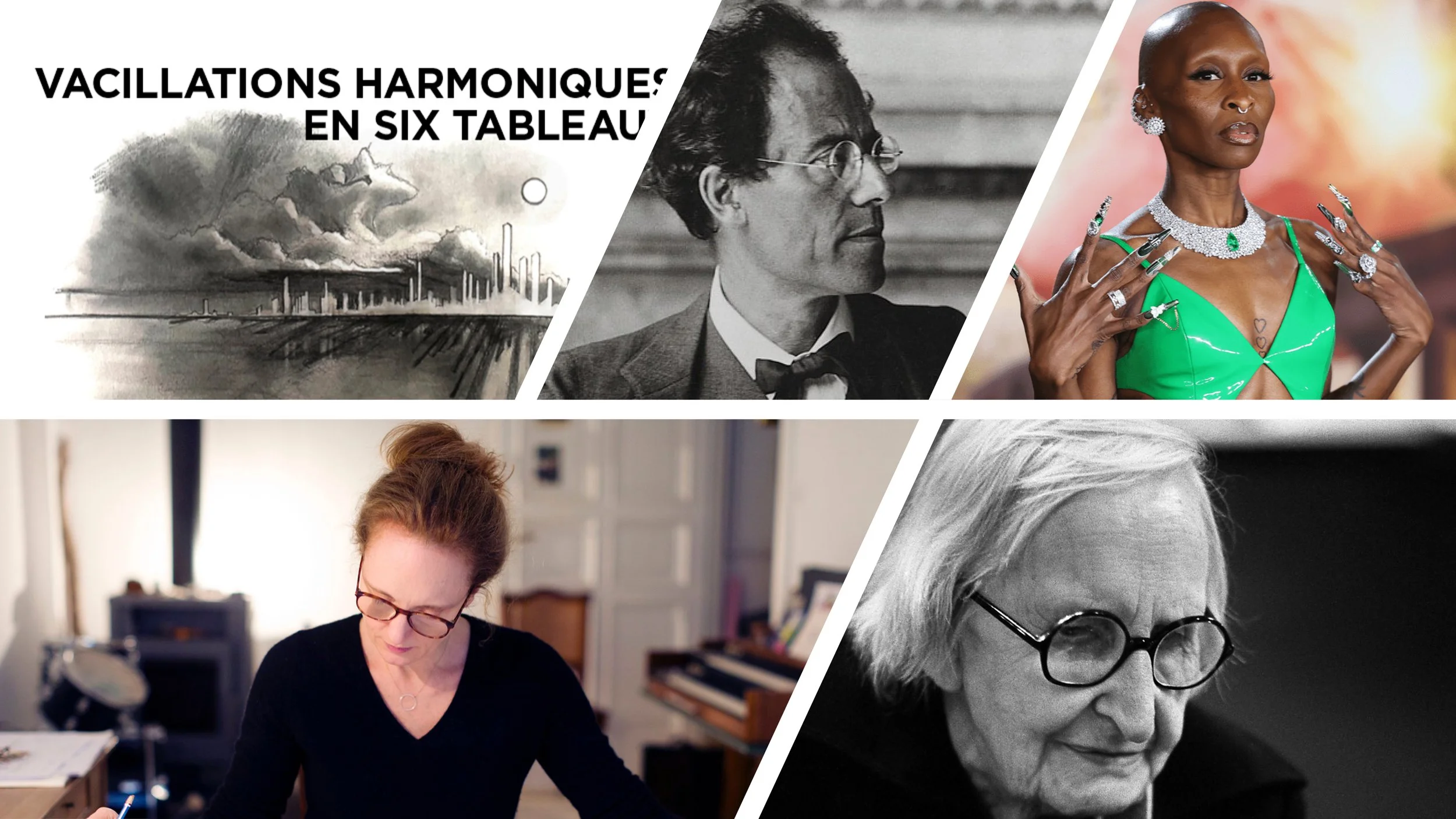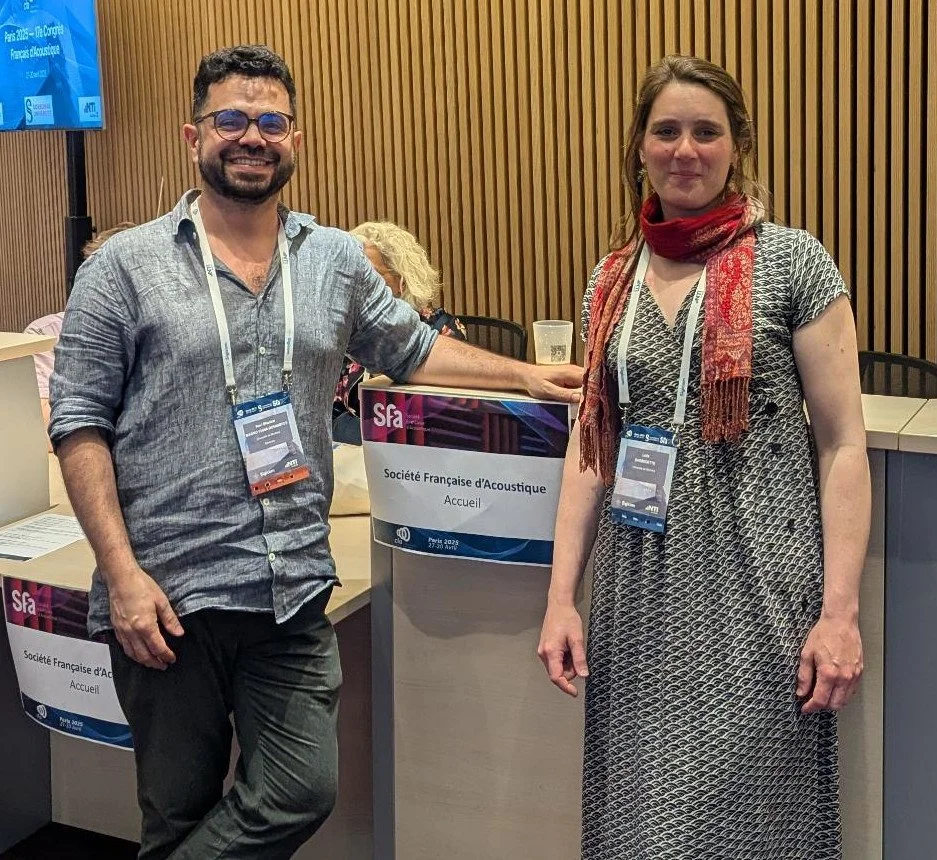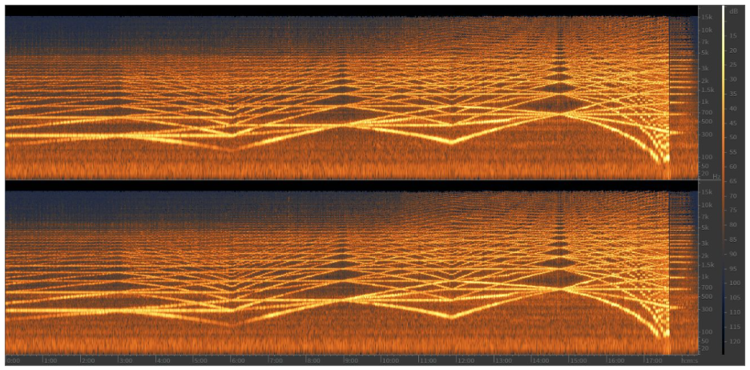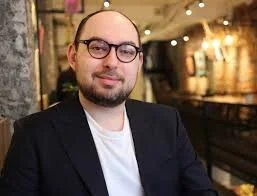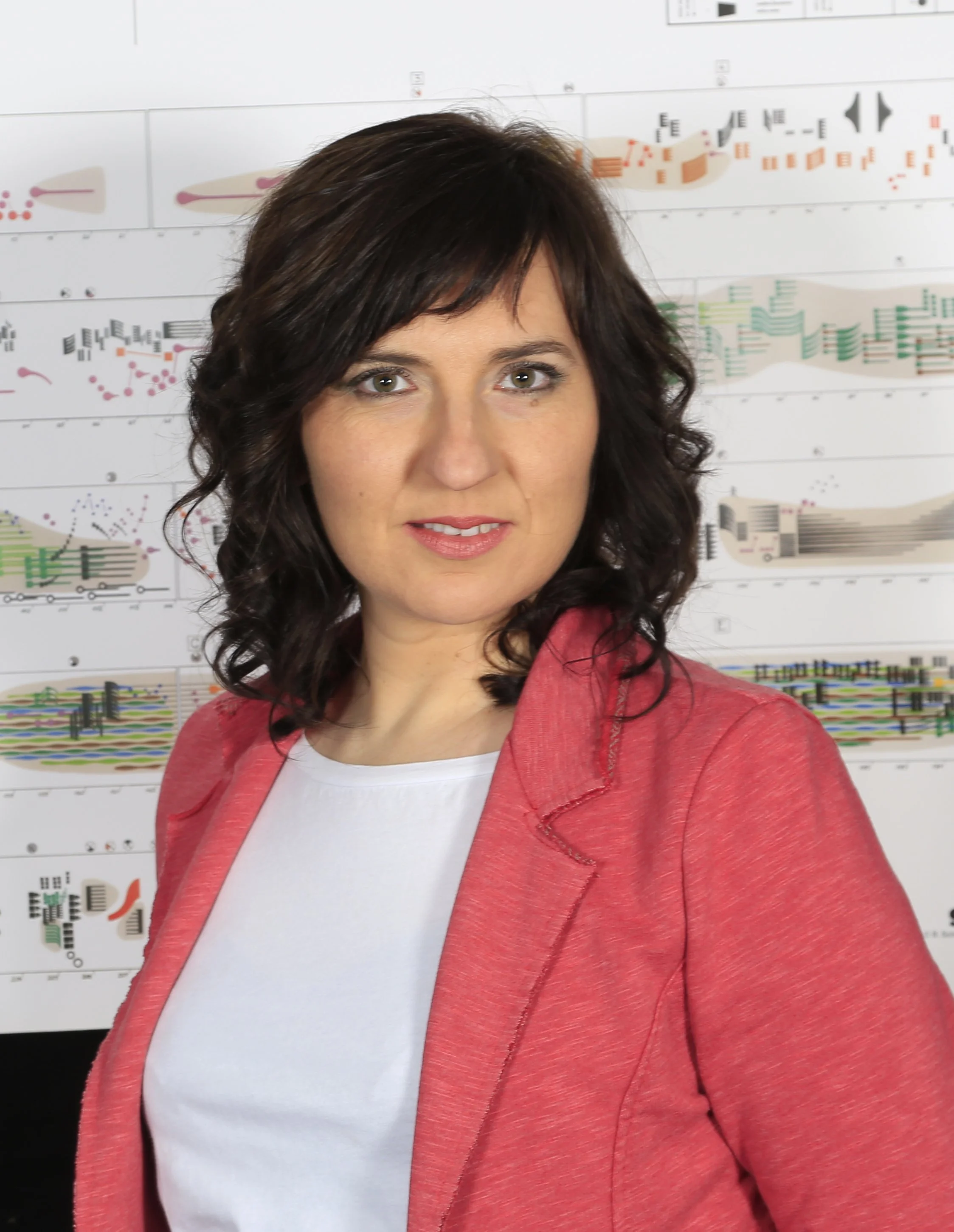Newsletter no. 50
EN | FR
EDITOR'S NOTE
After seven productive and enriching years, the ACTOR Project is drawing to a close. On behalf of the editorial team, I would like to extend heartfelt thanks to everyone who contributed to this long-term research effort—our members, student researchers, collaborators, and partner institutions. Your dedication has been essential in advancing Timbre and Orchestration scholarship in meaningful ways. The project's outcomes are also set to influence and help define the field as it continues to evolve.
Special thanks go to Stephen McAdams and Bob Hasegawa for their vision and leadership; to the three generations of postdoctoral fellows, whose work was central to shaping the presentation of research outcomes as structured resources online; and to André Martins de Oliveira for his excellent coordination and commitment as project coordinator.
Thank you for being part of this journey. We wish everyone continued success in their future professional endeavors.
The newsletter will not entirely go dormant. We have decided to maintain a low level activity in order to maintain the community informed about members' activities and news so stay tuned!
Andrés Gutiérrez Martínez
ACTOR Newsletter Editor
ACTOR OUTCOMES
TOR Spotlight
New TOR Publications!
Your ACTOR postdocs have been hard at work in anticipation for the conclusion of ACTOR and the temporary hibernation of the TOR. As a result, we've published some new essays and project reports, including:
Rosner, J. (2025). “Hearing Form in Phenomenological Music: an analysis of Molly’s Song 3 – Shades of Crimson by Rebecca Saunders.” https://timbreandorchestration.org/writings/amazing-moments-in-timbre/hearing-form
Hill, E. (2025). “The Most Momentous Cymbal Crash of Mahler’s 3rd Symphony.” https://timbreandorchestration.org/writings/amazing-moments-in-timbre/mahler-cymbal-crash
Cook, K. (2025). “I’m Not that Girl by Cynthia Erivo from Wicked.” https://timbreandorchestration.org/writings/amazing-moments-in-timbre/im-not-that-girl
McGartland, A. (2025). “Orchestration as Form in Elisabeth Lutyens’s And Suddenly It’s Evening (1966).” https://timbreandorchestration.org/writings/amazing-moments-in-timbre/orchestration-form-lutyens
De Francisco, M., et al. (2025). “Recording and Mixing a French Sound: The Case of Beethoven’s Erard Frères Piano.” https://timbreandorchestration.org/writings/project-reports/erard
Burton, V. and Tatar, J. (2025). “TEK: Listening for Meter and Timbre in Chicago Footwork.” https://timbreandorchestration.org/writings/project-reports/tek
Kob, M., et al. (2025). “Odessa IV New Orchestra Recordings – Measurements- Systematic Anaysis." https://timbreandorchestration.org/writings/project-reports/odessa-iv
Hasegawa, R., et al.. (2025). “ACTOR-Quasar Project., Composing with Multiphonics“ https://timbreandorchestration.org/writings/project-reports/quasar-project
Creations & Productions
Detmold Musical Instrument Timbre Explorer (DmITE) is online
Radiation characteristics of musical intsruments change with pitch. The aspects of timbre conveyed by the spectrotemporal variations in a recording are specific to the microphone placement. This leads to effects of directional tone color, clearly audible by comparing simultaneous recordings from different positions relative to an instrument.
A new tool, the Detmold Musical Instrument Timbre Explorer (DmITE), offers a systematic, audio-visual exploration of this musical sound radiation phenomenon.
DmITE is a web-based interface to a database of anechoic music recordings from 28 different musical instruments surrounded by a circular microphone array. During playback, a video of a polar spectrogram representation visualizes the spectrotemporal variations in the sound field sampled by the microphone array, while monitoring a single channel of choice. This GUI makes possible the audio-visual sound comparison between musical instruments, notes, and recording angles in a web page.
This functionality of DmITE is facilitated by the implementation in the IEEE1599 language.
IEEE1599 is an XML-based format designed to offer a comprehensive and multi-layered representation of music based on events. Central to the format is a logical data structure called the "spine," which synchronizes different interpretations of the same score for comparative playback.
DmITE supports two playback modes: melody (full-track) and single-note (isolated note) to aid in focused comparison. Since all instruments perform the same melody and IEEE1599 allows fast and seamless channel switching, users can make direct timbral comparisons across instruments, notes, and recording angles. The interface allows simultaneous viewing of up to three visualizations from the existing dataset.
Though initially developed for education, DmITE is designed to evolve—with potential for enhanced recordings, new visual formats, and 3D spatial representations.
Accessible via standard web browsers at DmITE (https://dmite.lim.di.unimi.it/), this tool provides a platform for self-guided learning, making it especially valuable for students and professionals in sound recording, orchestration, and musical acoustics.
DmITE interface has been developed by Detmold-based team of researchers from the Erich-Thienhaus-Institut (ETI) and from the Kreativ.Institute OWL (KIO) supported by the Laboratorio di Informatica Musicale (LIM), Milan, Italy. The database behind DmITE has been collected by ACTOR member Timo Grothe of ETI, Hochschule für Musik Detmold, and will be made available online.
ACTOR member Axel Berndt of KIO, University Paderborn will present/presented DmITE in the upcoming/final ACTOR Y7 workshop in Geneva.
Publications
Korsmit, I. R., Montrey, M., Wong-Min, A. T. K., & McAdams, S. (published online, 14/07/2025). Perceived and induced affective responses to musical sounds: The influence of instrument family, pitch register, and individual differences. Music Perception. https://doi.org/10.1525/mp.2025.2476898 [open-access preprint. https://osf.io/preprints/psyarxiv/fxk96]
Detection of Orchestral Blends in Musical Scores
Publication and conference presentation by ACTOR Student member Franceso Maccarini, Olivier Anoufa, Mathieu Giraud, Flrence Levé, and Stephen McAdams entitled Detection of Orchestral Blends in Musical Scores at the Computer Music Multidisciplinary Research Conference in Graz (July 10-12). Read more
Presentations
17th Congrès Français d’Acoustique
Two ACTOR students members from U. of Montréal under the supervision of Caroline Traube, Leïla Barbedette and Ravi Shankar Domingues, have participated to the 17e Congrès Français d’Acoustique, 27–30 avril, Paris, France.
Barbedette, Leïla, Caroline Traube et Claudia Fritz, Perception of the timbre of string quartet instruments: Results of a survey on the use of vocal analogies by performers and instrument builders [La perception du timbre des instruments du quatuor à cordes: Résultats d’une enquête sur l’usage d’analogies vocales par les interprètes et les luthiers].
Abstract: https://cfa2025.fr/pdfs/livret-resumes.pdf p.747
Domingues, Ravi. S. M. V., & Caroline Traube (2025). Influence of sound culture on the perception of oboe timbre: a comparative study [Influence de la culture sonore sur la perception du timbre du hautbois : une étude comparative].
Abstract: https://cfa2025.fr/pdfs/livret-resumes.pdf p.607
Workshop on Perception-Based Orchestration for Composer-Performers
A 1-week online summer workshop on Perception-Based Orchestration for Composer-Performers has been taught by Prof. Nick Virzi and ACTOR student member Yuval Adler. The event was hosted at CCRMA, Stanford University, August 11-15. Read more
AWARDS & HONOURS
Patricia Carpenter Emerging Scholar Award
ACTOR student member Rebecca Moranis, a Ph.D. candidate at the City University of New York Graduate Center, received the Patricia Carpenter Emerging Scholar Award for the best student paper delivered at the recent annual meeting of the Music Theory Society of New York. Her paper was entitled “An Analysis of Joni Mitchell’s Vocal Evolution” and will appear in a future issue of Theory and Practice.
Arthur J. Komar Student Award
ACTOR Student member Joshua Rosner received the Arthur J. Komar Student Award at Music Theory Midwest for his presentation Mapping Musical Structure onto Phonetic Choices: A Corpus Study of Jazz Scat Solos, co-authored with Prof. Oriana Kilbourn-Ceron (Concordia University).
Joshua presented an up-to-date version of this project at the Y7 meeting in Geneva as part of the Student Presentations.
New roles for ACTOR members
ACTOR Student member Erica Huynh has accepted a position as a Scientist for Klick Health working on detection of vocal biomarkers (vocal timbre) to predict physiological changes.
ACTOR Collaborator Lena Heng has accepted a position as Assistant Professor of Psychology at St. Francis Xavier University in Antigonish, Nova Scotia.
Outgoing ACTOR Postdoc Andrés Gutiérrez Martínez has accepted a position as University Professor for Electroacoustic Composition at the Gustav Mahler Privatuniversität für Musik in Klagenfurt, Austria.
Outgoing ACTOR Postdoc Ben Duinker has accepted a position as Academic Associate in charge of International Partnerships in McGill University’s School for Continuing Studies.
We wish them continued success in these new roles!
Workshop
Y7 Workshop
From July 7–9, members of the ACTOR Project met for the final time at the Haute École de Musique de Genève (HEM) to share the work accomplished by the various working groups over the past year, while also looking ahead to future possibilities. Discussions ranged from the continuation of specific projects, thematic focuses, and research axes, to intercultural exchange among musical communities represented by new partner institutions and collaborators worldwide. The group also discussed the importance of real exchange between European- and North American–based research in the areas pertaining to performance, as well as broader engagement with interdisciplinary frameworks and the humanities.
Members engaged in meaningful dialogue around the potential continuation and expansion of several initiatives under the TONE framework, contingent on project approval in April 2026.
We extend our sincere thanks to Gilbert Nouno, Luis Naón, Victor Cordero, Marc Garcia Vitoria, Rémy Campos, and Florencia Novoa for their generous hospitality; to the musicians and composers who took part in the concert on July 10; and to the technical team for their seamless support of the remote sessions.
TONE Updates
TONE succeeds in Stage 1
The ACTOR Project is absolutely delighted to announce that the TONE Partnership (Timbre and Orchestration NEtwork) proposed to SSHRC has been accepted at the first stage and will now pass on to Stage 2 with a more detailed proposal due in late October 2025! Fasten your seatbelts for more exciting research on Timbre and Orchestration starting in April 2026!!
Ingrid Pustijanac
Ingrid Pustijanac is Associate Professor of Musicology at the Department of Musicology and Cultural Heritage in Cremona, University of Pavia, where she teaches courses in methodologies of music analysis and the history of forms and compositional techniques in contemporary music. She holds diplomas in Composition and Choral Conducting, and also studied Electronic Music. From 2002 to 2013, she was active as a choral conductor, directing the Choir of the Faculty of Musicology and working across both early and contemporary repertoire.
Her research focuses on late 20th- and 21st-century music, with particular attention to spectral and post-spectral music, experimental and electroacoustic improvisation, and the analysis of compositional processes based on the study of sketches. She is the author of a monograph on the music of György Ligeti and has published extensively on contemporary music of Berio, Grisey, Donatoni, Sciarrino, Romitelli, Verrando, among others.
She is a member of the editorial board of Archival Notes (Cini Foundation, Venice) and the founder of DALM / Dialogic Approaches to Living Musics, a research group devoted to the study of contemporary musical creativity. Since 2019, she has been leading the research project Music of the 21st Century, which promotes annual encounters with composers and focuses on the analysis of current compositional languages, practices, and aesthetics through dialogue, performance, and research. The project is closely connected to the research group CCOrP – Contemporary Composition and Orchestration Practice, developed in collaboration with the Conservatory of Mantua. Among the many composers who have taken part in the project are Franck Bedrossian, Clara Iannotta, Salvatore Sciarrino, Yan Maresz, Mauro Lanza, and Francesco Filidei.
She collaborates as a musicologist with major contemporary music festivals such as La Biennale di Venezia, Milano Musica, and Biennale Zagreb.
In addition, she serves on the scientific committees of leading international research initiatives and conferences, including ACTOR (Analysis, Creation, and Teaching of Orchestration) at McGill University (Canada) and ITI-CREAA (Centre de Recherche et d’Expérimentation sur l’Acte Artistique) at the University of Strasbourg. She is also responsible for the section on contemporary music entries in the DEUMM Online (the Italian dictionary of music and musicians).
Photo credit: Carlo Ferraroni


